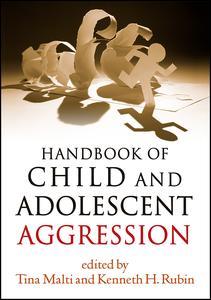Description
Handbook of Child and Adolescent Aggression
Coordinators: Malti Tina, Rubin Kenneth H.
Language: English
Subject for Handbook of Child and Adolescent Aggression:
· 17.8x25.4 cm · Hardback
Description
/li>Contents
/li>Readership
/li>Biography
/li>
Presenting cutting-edge work from leading scholars, this authoritative handbook reviews the breadth of current knowledge on aggression from infancy through adolescence. The volume explores the forms and functions of aggression and the multiple factors that contribute to its emergence, development, and consequences, including genetic and biological influences, temperament, family dynamics, peer relations, and social inequality. It provides up-to-date perspectives on problems such as disruptive and defiant behaviors, bullying (including cyberbullying), social aggression, and youth violence, and examines relations between aggression and normative social?emotional and social-cognitive development. It also discusses the opposite end of the spectrum, including kindness and prosocial behaviors. Identifying important implications for practice and policy, contributors describe effective approaches to screening, assessment, and intervention in family, school, community, and clinical settings.
Foreword, Tracy Vaillancourt
I. Foundations of Aggression, Trajectories, and Antecedents
1. Aggression in Childhood and Adolescence: Definition, Theory, and History, Tina Malti & Kenneth H. Rubin
2. Clinical Classifications of Aggression in Childhood and Adolescence, Paul J. Frick & Tatiana M. Matlasz
3. Developmental Trajectories of Aggression Subtypes: From Early to Late Childhood, Jamie M. Ostrov, Kristin J. Perry, & Sarah J. Blakely-McClure
4. Behavior Genetics of Aggression, Mara Brendgen, Frank Vitaro, & Michel Boivin
5. Psychophysiology of Aggression, Susan Branje & Hans M. Koot
6. Temperament and Aggression, Christina C. Moore, Julie A. Hubbard, & Megan K. Bookhout
7. Social–Emotional Development and Aggression, Tina Malti & Ju-Hyun Song
8. Social-Cognitive Development and Aggression, Jennifer E. Lansford
II. Aggression in Context
9. Parenting, Parent–Child Relationships, and the Development of Aggression during Childhood and Adolescence, K. Lee Raby & Glenn I. Roisman
10. Aggression and Functioning with Peers, William M. Bukowski & Frank Vitaro
11. Aggression and Morality in Childhood and Adolescence, Tina Malti, Tyler Colasante, & Marc Jambon
12. Social Networks and Aggression, Jelle J. Sijtsema & Tiina J. Ojanen
13. Cyberbullying, Marion K. Underwood & Sheri A. Bauman
14. Poverty, Social Inequality, and Aggression, Tama Leventhal, Véronique Dupéré, & Margaret C. Elliott
III. Interventions and Policy Implications
15. Measuring Social–Emotional Correlates of Aggression in Children and Adolescents, Tina Malti, Antonio Zuffianò, & Connie Cheung
16. Youth-Focused Intervention for Severe Aggression, John E. Lochman, Caroline L. Boxmeyer, Brendan Andrade, & Pietro Muratori
17. Family-Based Treatments for Aggressive Problem Behavior, Elizabeth A. Stormshak & S. Andrew Garbacz
18. Preventing Aggression and Youth Violence in Schools, Shelley Hymel & Dorothy L. Espelage
19. International Perspectives on Bullying Prevention, Christina Salmivalli
20. Can Positive Youth Development Programs Prevent Youth Violence?: The Role of Regulation of Action and Positive Social Engagement, Nancy G. Guerra
21. Challenges and Priorities for Researchers, Kenneth H. Rubin & Tina Malti
22. Challenges and Priorities for Practitioners and Policymakers, Sarah Lindstrom Johnson, Sabina Low, & Catherine P. Bradshaw
Tina Malti, PhD, is Professor of Psychology and Director of the Laboratory for Social–Emotional Development and Intervention at the University of Toronto. She serves as Associate Editor of Child Development and as Membership Secretary (2014–2020) of the International Society for the Study of Behavioral Development. She is a Fellow of the American Psychological Association and the Association for Psychological Science. Dr. Malti is the recipient of New Investigator awards from the Canadian Institutes of Health Research, the Ontario Ministry of Research and Innovation, the Society for Research on Adolescence, and the International Society for Research on Aggression. Her research interests include the origins, pathways, and consequences of aggression and kindness in childhood and adolescence. She creates and implements interventions to enhance social–emotional development and reduce aggression and exposure to violence in children facing multiple forms of adversity.
Kenneth H. Rubin, PhD, is Professor of Human Development and Quantitative Methodology and Founding Director of the Center for Children, Relationships, and Culture at the University of Maryland, College Park. He is a Fellow of the American and Canadian Psychological Associations, the Association of Psychological Science, and the International Society for the Study of Behavioral Development (ISSBD). Dr. Rubin is a recipient of Distinguished Contribution awards from the Society for Research in Child Development and the ISSBD, the Mentor Award in Developmental Psychology from the American Psychological Association, and the Pickering Award for Outstanding Contribution to Developmental Psychology in Canada from Carleton University. His research focuses on peer and parent–child relationships and the origins and developmental course of social and emotional adjustment and maladjustment in childhood and adolescence.




